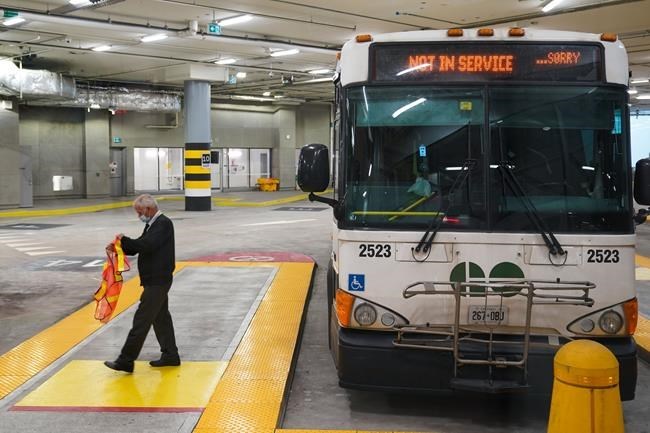TORONTO — A strike by GO Transit workers that began Monday shut down regional bus service across the Greater Golden Horseshoe, leaving commuters scrambling to make last-minute changes to their travel plans.Â
Workers including GO bus drivers, station attendants and other employees walked picket lines outside Toronto's Union Station, a major transit hub, as commuters looked to reroute via GO trains, which were still running.Â
Sheila Martin, a GO bus driver of 17 years, said she felt "really sorry" about the disruptions to service, but described the strike as an attempt to ensure the future of quality transit service.Â
"We just want our voices heard. And we don't want to lose our jobs," she said. "We don't want to be contracted out for cheaper employees."
The strike began after Metrolinx, which runs GO Transit, and the Amalgamated Transit Union Local 1587 did not reach a deal over the weekend.Â
The union said Metrolinx failed to put forward a proposal Sunday that addressed key bargaining issues, including written commitments to hire more full-time employees and protections against hiring outside contract workers.Â
The union said it plans to file a complaint with the Ministry of Labour accusing Metrolinx of bad-faith bargaining.Â
"It was crystal clear to us, they did not want to reach an agreement," ATU international vice-president Manny Sforza said Monday while flanked by dozens of workers picketing outside Union Station.
Sforza said if Metrolinx prepares an improved proposal, "there could be an agreement within hours."Â
"We're willing to go back to the table tomorrow and end a strike that should never have happened," he said.Â
Metrolinx spokeswoman Anne Marie Aikins said Metrolinx had "always bargained in good faith" and remained willing to "get back to the table and to reach an agreement."Â
"We were quite surprised that the ATU tabled several new issues, with new language and time ultimatums that could not be reasonably met and then walked away from the negotiations over the weekend," she said.Â
Aikins has also acknowledged the union's concerns about contracting outside workers, but maintained the company has measures in place to ensure safety for all.
Inside Union Station in downtown Toronto, some commuters scanned train schedules on Monday morning after learning bus service was suspended due to the strike.Â
Abdul Zahad, a 25-year-old Conestoga College student, arrived at the station to take a bus from Toronto to Kitchener, Ont., for a meeting on campus. Instead, he had to opt for a train that departed two hours later than his planned bus.Â
"I have to wait here, that's the only option I have now," he said. "Since all the buses are cancelled, it's very hectic."Â
Stella Hill, who was on her way from Whitby, Ont., to Guelph, Ont., was also forced to change her travel plans.Â
While she usually makes the trip via bus, the strike meant using trains instead, adding more than two hours to her trip. Hill, a senior, said she prefers to take the bus for the entire route, in part to avoid long walks between terminals.
"That's a lot of trouble because it's a bit of a distance," she said.
Monday's strike began after the two sides averted a strike previously set for Oct. 31 when Metrolinx presented the union with a tentative offer. But 81 per cent of union members voted it down.Â
Negotiations started in April and the union has been working without a contract since June. The union said it's the first time GO Transit bus operators have gone on strike.Â
This report by The Canadian Press was first published Nov. 7, 2022.
Jordan Omstead, The Canadian Press



